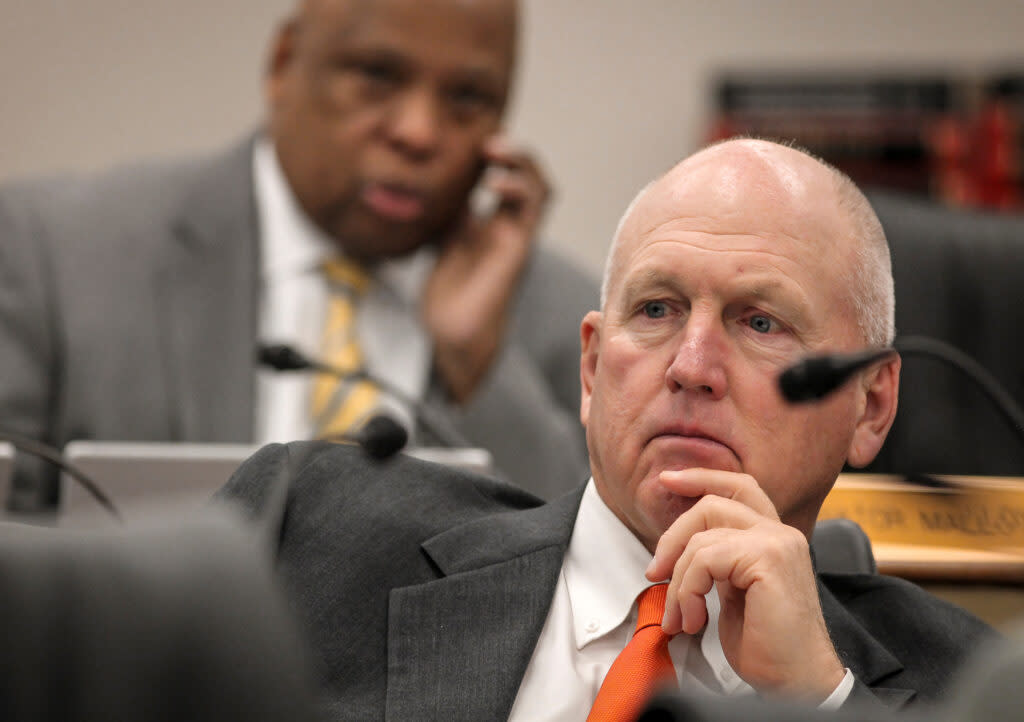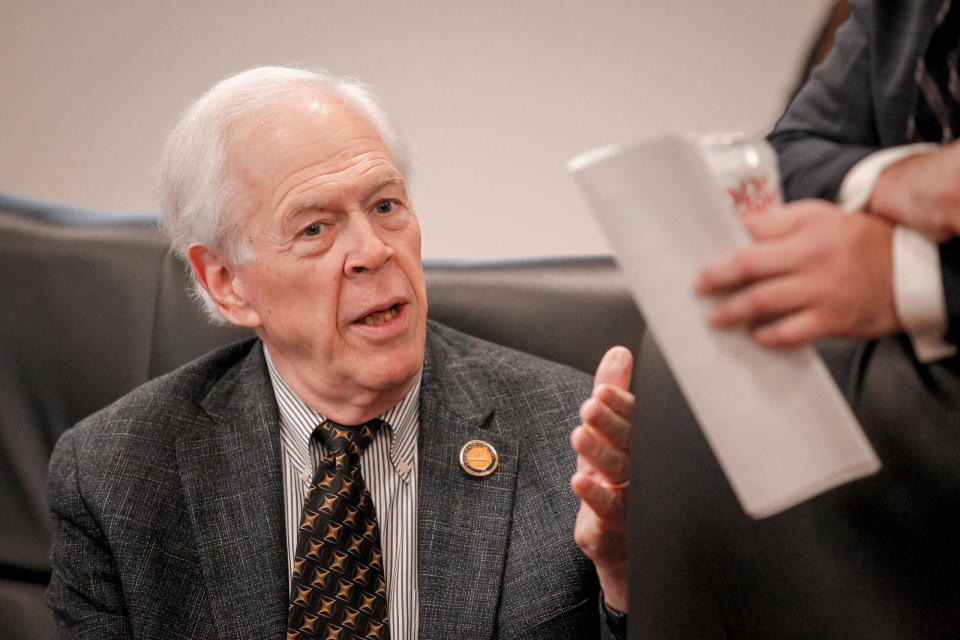Group organizing convention to alter Constitution almost got SC funding. Legislators to try again.

- Oops!Something went wrong.Please try again later.
- Oops!Something went wrong.Please try again later.
Sen. Rex Rice, R-Easley, is seen during a Senate Judiciary Committee meeting in Columbia, S.C. on March 15, 2022. He is the sponsor of a $50,000 budget earmark vetoed by Gov. Henry McMaster. (File/Travis Bell/STATEHOUSE CAROLINA/Special to the SC Daily Gazette)
COLUMBIA — South Carolina almost became the third state to send taxpayer dollars to a group seeking to amend the U.S. Constitution through a national convention. The option has never happened, but the idea’s gained traction over the last decade, mostly in GOP-led states.
The $50,000 earmark was among the spending items struck by Gov. Henry McMaster.
The Republican governor vetoed $2.3 million total from the Legislature’s $14.5 billion spending package. It’s a sum so small, House and Senate leaders have no plans to call their chambers back to the Statehouse for a special session to vote on overriding him.
That means the Phoenix Correspondence Commission, a quasi-government entity based outside of Sacramento, California, won’t get $50,000 from South Carolina this year.
But Rep. Bill Taylor, who’s been calling for a state-led convention for over a decade, says he’ll try again in next year’s budget.

In his veto message, McMaster said he supports the group’s mission of organizing a convention of states to rein in federal spending. But he faulted how the state budget funded it.
If the $50,000 pays for the participation of South Carolina’s three legislative delegates, then it should come from House and Senate budgets for travel and membership dues, not funneled through the state Department of Archives and History, the governor wrote.
Taylor, who sits on the House Ways and Means Committee, said he’ll follow the advice.
Next year, he told the SC Daily Gazette, he’ll try to get money “for the Phoenix Commission in the budget category suggested by the governor in support of South Carolina’s efforts to rein in the out-of-control federal government.”
The money would have matched contributions to the commission made by two other states: Utah and Arizona.
Legislators from roughly three dozen states participate in the commission. South Carolina was on track to be just the third to contribute to its work. Several other states are considering providing financial support, according to its executive director, Bruce Lee.
The nation’s Founding Fathers provided two ways to amend the U.S. Constitution — through Congress or by the states. The former has happened 27 times. The latter has never happened since the 1787 convention in Philadelphia that produced the Constitution.
But its Article V allows for a convention if two-thirds of states, or 34, pass a resolution seeking one. If that happens, any amendment proposed during it would then still need to be approved by 38 states.
The Phoenix Correspondence Commission monitors the status of Article V resolutions nationwide and — should they get to 34 — intends to petition Congress to call for one and help organize it. It was born out of a gathering of legislators from 22 states held in Phoenix, Arizona, in 2017. The commission was up and running two years later to coordinate convention efforts, Lee said.
In 2022, McMaster signed a law that made South Carolina the 19th state calling for a state-led constitutional convention with the stated purpose of forcing Congress to rein in spending, limit the federal government’s power and cap how long federal politicians can remain in office.
No other state has passed one like it since.
Taylor acknowledged that convening a convention of states will be difficult and may never happen.
“It’s a big lift, but long-term, it’s important,” said the Aiken Republican, who’s been the chief sponsor of Article V resolutions since 2013.
The ballooning federal debt has been a uniting issue, said state Sen. Rex Rice, who sponsored the $50,000 allocation to the commission.
“We’re talking about the fact that the federal government is spending money that they don’t have. What we’re doing for our children and our grandchildren is of great concern to me, and should be the most South Carolinians,” said the Easley Republican. “There’s definitely a benefit to all taxpayers because right now, the federal government is out of control on its spending, and the (commission) is going to help us bring that back in hopefully.”
For years in South Carolina, opponents across the political spectrum warned of a runaway convention that could drastically alter America. They warned legislators there’s no way to limit discussion on proposed changes. Such fears are what prompted the Legislature in 2004 to repeal a law passed 28 years earlier calling for a convention.
In signing the legislation, McMaster said there are enough safeguards in the Constitution itself to prevent that.
Lee said that’s where the commission comes in. He said it would be the group’s job to try to ensure states stay within the parameters of why a convention is called. He also recommends states pass statutes requiring any delegates sent to a convention to stick to specific issues.
The commission has been operating on $100,000 total from Utah and Arizona, what Lee called “seed money.”
“We’ve got a very tight budget,” Rice told the SC Daily Gazette. “We are working on a shoestring.”
According to its website, South Carolina is the only state with three delegates: Rice, Taylor, and state Rep. Jason Elliott, R-Greenville, who faces no opposition in November for a state Senate seat. The three were approved by House Speaker Murrell Smith and Senate President Thomas Alexander.
Rice and Taylor compared the $50,000 request to other legislative membership dues paid by the state budget.
This year, taxpayers paid the Legislature’s dues for membership in three nonpartisan groups. The total, almost $516,500, covers the entire General Assembly, according to data from the Senate clerk’s office.
Broken down, $230,740 paid for dues to the National Council of State Legislatures; $215,599 went to the Council of State Governments for membership in the Southern Legislative Conference; and $70,115 went to the Uniform Laws Commission, which is primarily for legislative staff.
Lee said the Phoenix group has no membership dues and states are not required to contribute financially to participate.
“It’s not pay to play,” he said.
But if more states contributed to the commission, Lee said, the group could afford to hold educational conferences and publish more materials, such as the handbook for state legislators that the commission is working to put together.
Lee said the funding from states would also pay for the costs of administrating a convention of states if one is called.
The benefit of being involved in the commission, Lee said, is first-hand information on what other states are considering resolutions and being part of the decision making process.
The post Group organizing convention to alter Constitution almost got SC funding. Legislators to try again. appeared first on SC Daily Gazette.

